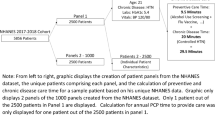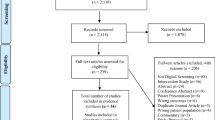Abstract
Despite recommendations for ongoing care after pregnancy, many individuals do not see a primary care clinician within the first postpartum year, missing a critical window to engage reproductive-age individuals in primary care. We administered an anonymous, cross-sectional, trilingual survey at a large urban safety-net hospital to assess postpartum individuals’ preferences, health concerns, and anticipated barriers to primary care during the year after pregnancy. While 90% of respondents preferred a visit within one year, most individuals – including those with complicated pregnancies – did not recall a primary care recommendation from their pregnancy care team. Respondents reported a variety of primary care-amenable health concerns, and many social and logistical barriers to care. Preference for virtual care increased if self-monitoring tools were hypothetically available, indicating virtual visits may improve primary care access.
Significance
The postpartum year is a time of increased health risks, when individuals – especially those with recent pregnancy complications – are likely to benefit from ongoing care. In minoritized and structurally marginalized communities, low rates of postpartum follow-up compound high rates of pregnancy complications, perpetuating health inequities.
AbstractSection What this Study Adds?In a racially, ethnically, and linguistically diverse and predominantly low-income sample, most postpartum individuals were unaware of recommendations to connect with primary care in the year after pregnancy, and most anticipated logistical and financial barriers to care. Increased care transition counseling, and logistical and financial support, are needed to help postpartum individuals access ongoing care.


Similar content being viewed by others
Data Availability
Surveys are included as supplemental material. De-identified data can be made available upon reasonable request to the corresponding author.
Code Availability
Code can be made available upon reasonable request to the corresponding author.
References
American College of Obstetricians and Gynecologists. (2018). Optimizing Postpartum Care. Committee Opinion 736. Obstetrics and Gynecology, 131(5), e140–e150.
American College of Obstetricians and Gynecologists. (2019). ACOG Practice Bulletin 212: Pregnancy and heart disease. Obstetrics & Gynecology, 133(5), e320. https://doi.org/10.1097/AOG.0000000000003243.
Caskey, R. N., Olender, S. E., Zocchi, A., Bergo, C. J., Uesugi, K. H., Haider, S., & Handler, A. S. (2021). Addressing women’s health care needs during pediatric care. Women’s Health Reports, 2(1), 227–234. https://doi.org/10.1089/whr.2021.0016.
Declercq, E. R., Sakala, C., Corry, M. P., Applebaum, S., & Herrlich, A. (2014). Major Survey findings of listening to MothersSM III: Pregnancy and birth. The Journal of Perinatal Education, 23(1), 9–16. https://doi.org/10.1891/1058-1243.23.1.9.
Frayne, D., & Bennett, I. (n.d.). IMPLICIT Network Leadership Council.
Gregory, E. F., Passarella, M., Levine, L. D., & Lorch, S. A. (2022). Interconception Preventive Care and recurrence of pregnancy complications for Medicaid-Insured women. Journal of Women’s Health, 31(6), 826–833. https://doi.org/10.1089/jwh.2021.0355.
Handler, A., Bergo, C., Dominik, B., Bier, E., & Caskey, R. (2021). A two-generation approach to postpartum care: Building on the well-baby visit. Birth, 48(3), 347–356. https://doi.org/10.1111/birt.12544.
Murray Horwitz, M. E., Rodriguez, M., Dissanayake, M., Carmichael, S., & Snowden, J. (2020). Postpartum health risks among women with hypertensive disorders of pregnancy, California 2008–2012. Journal of Hypertension, 38, 000–000.
Murray Horwitz, M. E., Molina, R. L., & Battaglia, T. A. (2021). Preventing chronic diseases after complicated pregnancies in the COVID-19 era: A call to action for PCPs. Journal of General Internal Medicine, 36(7), 2127–2129. https://doi.org/10.1007/s11606-021-06734-4.
Murray Horwitz, M. E., Prifti, C. A., Battaglia, T. A., Ajayi, A., Edwards, C. V., Benjamin, E. J., Yarrington, C. D., & Parker, S. E. (2023a). Pre-pregnancy cardiovascular disease risk factors and adverse pregnancy outcomes in a safety-net hospital. Journal of Women’s Health, Online ahead of print. https://doi.org/10.1089/jwh.2022.0322.
Murray Horwitz, M. E., Saradjha Brédy, G., Schemm, J. A., & Battaglia, T. A. (2023b). Strategies for recruiting a diverse postpartum survey sample. Journal of Racial and Ethnic Health Disparities. https://doi.org/10.1007/s40615-023-01886-x.
Rosener, S. E., Barr, W. B., Frayne, D. J., Barash, J. H., Gross, M. E., & Bennett, I. M. (2016). Interconception care for mothers during well-child visits with family physicians: An IMPLICIT network study. The Annals of Family Medicine, 14(4), 350–355. https://doi.org/10.1370/afm.1933.
Ruderman, R. S., Dahl, E. C., Williams, B. R., Davis, K., Feinglass, J. M., Grobman, W. A., Kominiarek, M. A., & Yee, L. M. (2021). Provider perspectives on barriers and facilitators to Postpartum Care for low-income individuals. Women’s Health Reports, 2(1), 254–262. https://doi.org/10.1089/whr.2021.0009.
Trost, S., Beauregard, J., Chandra, G., Njie, F., Berry, J., Harvey, A., & Goodman, D. A. (2022). Pregnancy-related deaths: Data from maternal mortality review committees in 36 US States, 2017–2019. Centers for Disease Control and Prevention, US Department of Health and Human Services.
Walker, L. O., Murphey, C. L., & Nichols, F. (2015). The broken thread of health promotion and disease prevention for women during the postpartum period. The Journal of Perinatal Education, 24(2), 81–92. https://doi.org/10.1891/1058-1243.24.2.81.
Wouk, K., Morgan, I., Johnson, J., Tucker, C., Carlson, R., Berry, D. C., & Stuebe, A. M. (2020). A systematic review of patient-, provider-, and health system-level predictors of postpartum health care use by people of color and low-income and/or uninsured populations in the United States. Journal of Women’s Health. https://doi.org/10.1089/jwh.2020.8738.
Yee, L. M., Martinez, N. G., Nguyen, A. T., Hajjar, N., Chen, M. J., & Simon, M. A. (2017). Using a patient navigator to improve postpartum care in an urban women’s health clinic. Obstetrics and Gynecology, 129(5), 925–933. https://doi.org/10.1097/AOG.0000000000001977.
Acknowledgements
The authors gratefully acknowledge the contributions of the survey participants. The authors also gratefully acknowledge funding from the Boston University Chobanian and Avedisian School of Medicine including its Department of Medicine Career Investment Award (MEMH), the American Heart Association (MEMH and CDY), the Boston University Clinical and Translational Science Institute through a grant from the NIH 1UL1TR001430 (TAB), the NIH 1R01HL158864 (CDY), and the Department of Health and Human Services, Maternal and Child Health Bureau, MCPH Leadership Education Program (LM).
Funding
Mara E. Murray Horwitz was supported by the Boston University Chobanian and Avedisian School of Medicine; the Boston University Chobanian and Avedisian School of Medicine Department of Medicine Career Investment Award; and the American Heart Association Career Development Award, 937987. Tracy A. Battaglia was supported by Boston University Clinical and Translational Science Institute through a grant from the NIH National Center for Advancing Translational Sciences 1UL1TR001430. Christina D. Yarrington was supported by a grant from the NIH National Heart Lung and Blood Institute 1R01HL158864. Mara E. Murray Horwitz and Christina D. Yarrington were additionally supported by a grant from the American Heart Association 979464. Lois McCloskey was supported in part by Department of Health and Human Services, Maternal and Child Health Bureau, MCPH Leadership Education Program, T7600017.
Author information
Authors and Affiliations
Contributions
MEMH: Conceptualization, Methodology, Investigation, Formal analysis, Writing – Original draft and Review & Editing, Visualization, Project administration, Funding acquisition; GSB: Investigation, Resources, Writing – Review & Editing, Visualization, Project administration; JAS: Investigation, Writing – Original draft, Review & Editing; TAB: Conceptualization, Writing – Review & Editing, Supervision; CDY: Conceptualization, Writing – Review & Editing, Supervision; LM: Conceptualization, Methodology, Writing – Review & Editing, Supervision.
Corresponding author
Ethics declarations
Ethics Approval
The research was conducted in accord with prevailing ethical principles and was approved by the Boston University Institutional Review Board (Application H-41819).
Consent to Participate
All persons gave their informed consent prior to their inclusion in the study.
Consent for Publication
Not applicable.
Conflicts of Interest
No conflicts of interest were reported by the authors of this paper. None of the funders had a role in the survey’s design, implementation, or analysis.
Additional information
Publisher’s Note
Springer Nature remains neutral with regard to jurisdictional claims in published maps and institutional affiliations.
Electronic Supplementary Material
Below is the link to the electronic supplementary material.
Rights and permissions
Springer Nature or its licensor (e.g. a society or other partner) holds exclusive rights to this article under a publishing agreement with the author(s) or other rightsholder(s); author self-archiving of the accepted manuscript version of this article is solely governed by the terms of such publishing agreement and applicable law.
About this article
Cite this article
Murray Horwitz, M.E., Brédy, G.S., Schemm, J. et al. Primary Care After Pregnancy Survey: Patient Preferences, Health Concerns, and Anticipated Barriers. Matern Child Health J (2024). https://doi.org/10.1007/s10995-024-03958-8
Accepted:
Published:
DOI: https://doi.org/10.1007/s10995-024-03958-8




